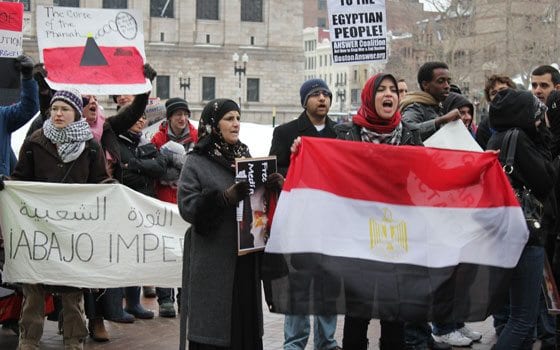
LAWRENCE, Mass. — For the past week, Amir Ghali has been either glued to the television watching the unrest unfold in his native Egypt or streaming live coverage on Al-Jazeera.
Protests against the lack of work, soaring food prices and the regime of President Hosni Mubarak are of great concern for Ghali, whose 88-year-old father, three older sisters and more than a dozen nieces, nephews and cousins still live in Egypt.
“I was really shocked when I saw them (protesters) destroy museums and their own legacy,” he said.
Ghali admits that in the past five to six years life in Egypt was changing, beginning with an economic slump and more animosity against the government.
“I never thought in a million years that Egypt was going to reach this point. I always thought (Mubarak) would be assassinated, die or turn over the country’s power to his son. I never thought he’d retire. Now I’m concerned we don’t have a true leader,” he said.
In order to keep protesters from organizing further, Mubarak shut down mobile phone networks and Internet in several areas of the country.
Ghali tried calling his family last Friday, but all the telephone lines were busy. He finally got through Saturday.
“It was a relief talking to them and knowing that they were safe,” said Ghali, a desktop support specialist at St. John’s Prep School in Danvers.
“The worst fear for a human being is to not feel secure,” said Ghali, who lives in Lawrence with his wife, Rosemary McCullough-Ghali.
Ghali, 31, talked to his family again Monday afternoon.
“They said things have come down a little bit,” Ghali said. Although food supplies are running low and banks are closed, some residents have maintained a community watch, walking the streets armed with pipes, wood or swords, “carrying anything which they feel can protect them.”
Watching the upheaval on television saddens Ghali.
“It really hurt. This is not the country I grew up in. It’s criminal,” said Ghali, who started visiting the United States as a tourist in 2000. He moved permanently in 2002 and became a U.S. citizen in 2006.
Ghali comes from a middle-class family. His father was a mechanical engineer for 42 years with KLM, a Dutch company. His mother, who died in 2008, was a school principal for more than 40 years.
He said that about 3,000 Egyptians live in Greater Lawrence, Natick and Nashua, N.H. The two biggest Coptic orthodox churches are in Natick and Nashua.
“Egypt is very, very important. Egypt has the history, and it was the place where people went to make their dream come true.”
“I feel lucky and proud to live in the United States, but I feel I need to be there for them. It’s frustrating,’’ he said.
Ghali was happy to see both Muslim and Christians fighting corruption.
“It shows me that true Egyptians are still there. It’s not about the religion as about the human rights and their lives,’’ he said.
Information from: Eagle-Tribune, http://www.eagletribune.com/






